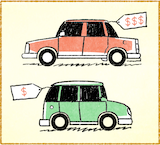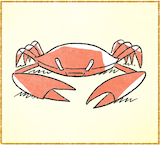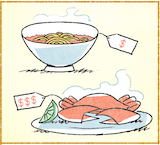



นี้คืออี่หยัง นี้คือขวด
ขวดอี่หยัง บ่ลู้คือกัน อาดสิเป็นขวดน้ำหลือขวดเหล้ากะได้
ขวดมีจักขวด ขวดมีสองขวด
ขวดมีสีอี่หยังแน่ ขวดมีสีเหลียงกับขวดมีสีเขียว
ขวดมีลาคาแพงบ่ มีลาคาแพงอยู่ ขวดสีเหลียงมีลาคาแพงหลาย ขวดสีเขียวมีลาคาถืกหลาย
เป็นหญังขวดสีเหลียงคือลาคาแพง บ่ลู้คือกัน อาดสิขวดใหญ่ หลือลาคาแพงกะได้
เป็นหญังขวดสีเขียวคือลาคาถืก บ่ลู้คือกัน อาดสิขวดน้อย ลาคามันเลยถืกกะได้
18
นี้คืออี่หยัง นี้คือลดเก็ง
ลดเก็งมีจักคัน ลดเก็งมีสองคัน
ลดเก็งคันใหญ่บ่ คันใหญ่อยู่ ลดเก็งคันสีแดงคันใหญ่ ลดเก็งคันสีเขียวคันน้อย
ลดเก็งมีลาคาแพงบ่ แพงอยู่ ลดเก็งคันใหญ่สีแดงมีลาคาแพงหลาย แพงบักคักหนึ่ง
ลดเก็งคันน้อยสีเขียวมีลาคาถืกหลาย ถืกบักคักหนึ่ง
19
นี้คืออี่หยัง นี้คืออี่ปู
อี่ปูมันโตสีหญัง อี่ปูมันโตสีแดง
อี่ปูมันโตใหญ่บ่ โตใหญ่อยู่ อี่ปูมันโตใหญ่หน่อยหนึ่ง
อี่ปูมันอยู่ใส อี่ปูมันอยู่ในทะเลหลืออยู่ในน้ำ
อี่ปูมันตาย้านบ่ ตาย้านอยู่ แต่บ่ตาย้านหลาย
อี่ปูมันมีก้ามสองก้าม แต่ละก้ามมันอันบักใหญ่หนึ่ง
ก้ามอี่ปูมันสามาดหนีบซิ้นเฮาได้ ซิ้นกะแปว่าหนังหลือเนี้ยของเฮานั้นหละ
ขั้นมันหนีบซิ้นเฮาแล้ว มันสิเจ็บบักคักหนึ่ง เจ็บอี่หลีอี่หลอ
อี่ปูมันมีจักขา อี่ปูมันมีแปดขา ข้างละสี่ขา ขาน้อยมีหกขา แล้วกะก้ามสองขา ลวมแล้วเป็นแปดขาพอดี
20
นี้คืออี่หยัง นี้คือกวยเตียวกับอี่ปู
กวยเตียวมันลาคาแพงบ่ บ่ กวยเตียวมันลาคาบ่แพง กวยเตียวมันลาคาถืก ถืกบักคักหนึ่ง
แล้วอี่ปูมันลาคาแพงบ่ แพงอยู่ อี่ปูมันลาคาแพงหลาย แพงบักคักหนึ่ง แพงกะด้อกะเดี้ย
เป็นหญังอี่ปูมันคือแพง เพาะว่าอี่ปูมันหาญากหลาย มันต้องลงไปในทะเล แล้วกะจับมันขึ้นมา ซัวสิหาได้แต่ละโต มันหาญากหลาย มันกะเลยลาคาแพง
แล้วอี่ปูมันแซบบ่ แซบอยู่ อี่ปูมันแซบหลาย อี่ปูมันแซบบักคักหนึ่ง แต่ว่ามันลาคาแพง คนกะเลยบ่ค่อยกิน
Link to overview page
Link to dictionary
| Isaan | Pronunciation | Tones | Thai | English/Notes |
|---|---|---|---|---|
| นี้ | ni: | HF | นี้ | 1. this 2. here |
| คือ | khʉ: | HR | คือ | 1. to be, to resemble, like, as 2. why {บักหล้าคือบ่เก็บโต่ะแน่ = [addressing a young boy] Why haven't you cleared the table?} |
| อี่หยัง | i:-yaŋ | H-M | อะไร | 1. what {นี้คืออี่หยัง = What is this?} {มื้อนี้เจ้าเฮ็ดอี่หยัง = What are you doing today?} {กินเข้างายกับอี่หยัง = What did you have for breakfast?} 2. something, anything, (in negations) nothing {บ่ต้องเฮ็ดอี่หยังอีกเลยนอกจากใส่ปุย = [we] don't need to do anything besides adding fertilizer} |
| ขวด | khu:at | LF | ขวด | bottle |
| บ่ | bɔ: | H | ไม่ | 1. no, not 2. question particle, transforming a statement into a question Notes: spelling exception in line with common usage on social media |
| ลู้ | lu: | HF | รู้ | 1. to know 2. to understand Notes: equivalent to ฮู้ |
| คือกัน | khʉ:-gan | HR-M | เหมือนกัน | 1. also, likewise, similarly {ยินดีที่ได้ฮู้จักคือกันคับ = Nice to meet you too!} 2. in negative sentences: either {บ่ลู้คือกัน = I don't know either} {จักคือกัน = I don't know (either)} |
| อาด | a:t | LF | อาจ | 1. might, may, will 2. likely |
| สิ | si | M | จะ | future tense auxiliary {เขากำลังสิตื่น = he's about to wake up} {สิไปตะหลาด = [I'm] going to the market} |
| เป็น | pen | M | เป็น | 1. to be, to exist 2. to be able to 3. to suffer, sth. happens to 4. เป็นหญัง[...]คือ in initial position: why? {เป็นหญังเขากะคือแปงฟัน = Why is he brushing his teeth?} {เป็นหญังเคี่ยงบินมันคือสิตก = Why is the airplane falling down?} |
| น้ำ | na:m | HF | น้ำ | 1. water 2. drink, soft drink, juice |
| หลือ | lʉ: | M | หรือ | or |
| เหล้า | lao | LF | เหล้า | alcohol |
| กะ | ga | M | ก็ | 1. then, consequently 2. also |
| ได้ | dai | HF | ได้ | 1. can 2. to get, to obtain 3. before verb: indicating past tense 4. บ่ได้ + verb: not |
| มี | mi: | HR | มี | 1. to have 2. there is |
| จัก | jak | M | จัก | 1. answer to a question: [I] don't know, don't know exactly, [I'm] not sure {พุซายคนนี้เขาเถ้าไป่ จัก จักเถ้าหลือบ่เถ้า เบิ่งบ่ค่อยออก = Is this man here already old? I don't know. I can't see clearly whether he's old or not.} {เขาเว้ากันอยู่ใส จักคือกัน = Where are they talking? I don't know either.} 2. exact(ly), what exactly {จักต้มอี่หยังกะบ่ฮู้ = I don't know what (exactly) he is cooking} {บ่ลู้คือกันจักปาอี่หยัง = I don't know either what kind of fish this is} 3. how much/many? {ต้นไม้มีจักต้น = How many trees are there?} {ตอนนี้จักโมงแล้ว = What time is it now?} {มือของเฮานี้สิมีจักนิ้ว = How many fingers do our hands have?} 4. a bit, a little bit {จักหน่อย/จักหน่อยหนึ่ง = a bit, a little bit} |
| สอง | sɔ:ŋ | M | สอง | two |
| สี | si: | M | สี | 1. color 2. colored pencil, crayon |
| แน่ | nɛ: | H | แน่, บ้าง | 1. some, somewhat 2. final particle, used to ask for examples (similar to Thai บ้าง at the end of a question) {หม้อใซ้เฮ็ดอี่หยังได้แน่ = What (different things) can a pot be used for?} {น้ำอัดลมซื้อได้อยู่ใสแน่ = Where/in which places can one buy soft drinks?} 3. final particle, when giving examples {มีเทิงส้งแน่ มีเสี้ยแน่ มีเกิบแน่ = there are trousers, shirts, shoes etc.} 4. final particle, used to give a command {ไปปิดหน้าต่างให้แน่ = Close the window!} 5. final particle, acting as an intensifier, especially in the pattern ... คัก ... แน่ {สูงคักสูงแน่ = very high} {ญ้องเฮาคัก ญ้องเฮาแน่ = [he's] praising me a lot} |
| เหลียง | li:aŋ | M | เหลือง | yellow |
| กับ | gap | M | กับ | 1. and {ลุงกับป้า = uncle and aunt} {กวยเตียวหมูกับกวยเตียวไก่ = noodle soup with pork and noodle soup with chicken} 2. with, to {ค้ายๆ กับคำว่า ... = similar to the word ...} 3. prefix in front of foods {กับเข้า = side dishes eaten with rice} {เขากินกับกวยเตียว = he's eating noodle soup} |
| เขียว | khi:ao | M | เขียว | green |
| ลาคา | la:-kha: | HR-HR | ราคา | price |
| แพง | phɛ:ŋ | HR | แพง | 1. expensive 2. dear |
| อยู่ | yu: | H | อยู่ | 1. to be (located) at 2. yet, still 3. auxiliary indicating continuous or progressive action {ทอดปาอยู่ในกะทะ = (in the process of) frying a fish in the pan} {แม่กำลังเมี้ยนเฮียนอยู่ = mother is cleaning/tidying up the house} |
| หลาย | la:i | M | เยอะ, มาก | many, much, very |
| ถืก | thʉ:k | LF | ถูก | cheap, inexpensive |
| หญัง | ɲaŋ | M | อะไร, เป็นหญัง = ทำไม | 1. what {เขากำลังเฮ็ดหญัง = What is he doing?} {ธูปเอาไว้เฮ็ดหญัง = What are incense sticks for?} 2. something, anything, (nothing) 3. เป็นหญัง[...]คือ in initial position: why {เป็นหญังเขาคือใส่บักพิกลงไปในกวยเตียว = Why is he putting chili in [his] noodle soup?} {เป็นหญังหน้าต่างมันคือเปิด = Why is the window open?} {เป็นหญังมันคือมีควนไฟ = Why is there smoke?} |
| ใหญ่ | ɲai | H | ใหญ่ | large, big |
| น้อย | nɔ:i | HF | น้อย | 1. few, little 2. small |
| มัน | man | HR | มัน | it (also used to refer to people) |
| เลย | lə:i | HR | เลย | 1. futher on, beyond, past {เข็มน้อยเลยเลขสิบสองไป = the minute hand has passed number twelve} 2. too much 3. at all 4. definitively 5. completely, utterly |
| ลดเก็ง | lot-geŋ | H-M | รถเก๋ง | car (sedan) |
| คัน | khan | HR | คัน | clf. for cars, trains, motorbikes, boats {ลดไฟคันนี้ = this train} {ลดเก็งคันสีเขียวคันน้อย = a small green car} |
| แดง | dɛ:ŋ | M | แดง | red |
| บักคักหนึ่ง | bak-khak-nʉŋ | M-H-H | intensifier: very, very much (variant of คัก) | |
| อี่ปู | i:-pu: | H-M | ปู | crab Notes: synonym: ปู |
| โต | to: | M | ตัว | 1. body, self 2. clf. for animals, characters/letters/consonants, appliances, clothes (e.g., pairs of trousers, shirts) |
| หน่อยหนึ่ง | nɔ:i-nʉŋ | H-H | นิดหน่อย | a bit, a little bit, not much Notes: see also หน่อยเดียว |
| ใส | sai | M | (ที่)ไหน | 1. where? {สิไปใส = Where are [you] going?} {มาแต่ใส = Where are [you] coming from?} {กะทะอยู่ใส = Where's the pan?} 2. somewhere, anywhere {ใสกะได้ = anywhere, wherever you like} |
| ใน | nai | HR | ใน | in, within |
| ทะเล | tha-le: | H-HR | ทะเล | sea |
| ตาย้าน | ta:-ya:n | M-HF | น่ากลัว | scary, not safe |
| แต่ | tɛ: | H | แต่ | 1. but {แต่บ่ต่างกันหลาย = but not very different} {แต่บ่ลู้ว่าเขาญ่างมาแต่ใส = but [I] don't know where he's coming from, see also: แต่ว่า} 2. only {ตอนนี้มีแต่ขี้ฝ้า = now there are only clouds} |
| ก้าม | ga:m | HF | ก้าม | claw, pincer |
| แต่ละ | tɛ:-la | H-H | แต่ละ | each {มือแต่ละข้างกะสิมีห้านิ้ว = each hand has five fingers} {แต่ละมื้อๆ = each day} |
| อัน | an | M | อัน | 1. thing, object 2. general clf. for objects |
| บัก | bak | M | 1. intensifier before adjectives {ปาโตบักใหญ่ = a (very) large fish} 2. prefix in front of fruits and vegetables {บักแตงโม = watermelon} 3. can be used as a reference for a male person of the same or younger age {บักอันนี้ = this lad} |
|
| หนึ่ง | nʉŋ | H | หนึ่ง | 1. one 2. after adjective: intensifier {บักคักหนึ่ง = very much} {อันบักใหญ่หนึ่ง = very large}, or attenuates the meaning {กะดาดมันแผ่นน้อยๆ หนึ่ง = the piece of paper is [relatively] small} |
| สามาด | sa:-ma:t | M-HF | สามารถ | can, to be able |
| หนีบ | ni:p | LF | หนีบ | to pinch |
| ซิ้น | sin | HF | ชิ้น | 1. piece, slice 2. skin {หนีบซิ้น = to pinch the skin} |
| เฮา | hao | HR | เรา | 1. personal pronoun: we 2. personal pronoun: I |
| แป | pɛ: | M | แปล | to mean, to translate |
| ว่า | wa: | H | ว่า | 1. that, as {คำว่า X = the word X} 2. to say |
| หนัง | naŋ | M | หนัง | 1. skin 2. movie, film {เบิ่งหนัง = to watch a movie} |
| เนี้ย | ni:a | HF | เนื้อ | meat Notes: pronunciation: also realized as เนื้อ |
| ของ | khɔ:ŋ | M | ของ | of, belonging to |
| นั้นหละ | nan-la | HF-M | นั่นแหละ | auxiliary for emphasis at the end of a phrase |
| ขั้น | khan | LF | เมื่อ | when, if |
| แล้ว | lɛ:o | HF | แล้ว | 1. finished 2. already 3. and then, and next (especially แล้วกะ) 4. auxiliary for past tense |
| เจ็บ | jep | M | เจ็บ | painful, to hurt |
| อี่หลีอี่หลอ | i:-li:-i:-lɔ: | H-M-H-M | จริง | intensifier: really Notes: variant of อี่หลี |
| ขา | kha: | M | ขา | leg {ขาหน้า = front leg} {ขาหลัง = hind leg} {ส้งขาญาว = long trousers} |
| แปด | pɛ:t | LF | แปด | eight |
| ข้าง | kha:ŋ | LF | ข้าง | 1. side {มีหูจับสองข้าง = there are handles on both sides} 2. next to {วางอยู่ข้างๆ ก่องใบใหญ่ = it's placed next to the large box} {เขายืนอยู่ข้างๆ อีกพุหนึ่ง = he's standing next to another person} 3. clf. for body parts which come in pairs (eyes, ears, legs etc.) {เขามีตาสองข้าง = she has two eyes} |
| ละ | la | H | ละ | each, per, every |
| สี่ | si: | H | สี่ | four |
| หก | hok | M | หก | six |
| ลวม | lu:am | HR | รวม | 1. total {ลวมแล้วเป็นแปดขาพอดี = in total, these are eight legs} 2. to assemble, to combine, to join {เอากะดาดหลายแผ่นมาลวมกัน = to put many pieces of paper together} Notes: see also ฮวม(กัน) |
| พอดี | phɔ:-di: | HR-M | พอดี | 1. to fit well 2. appropriate, just enough, just right {กะจกบานบ่ใหญ่ กะจกบานพอดี = not a large window, just right} {พอดีมือของเฮา = just right for his hand} 3. just in time, at the right moment, just this moment {แล้วพุซายคนนี้กะญ่างมาพอดี = and the man has come just now} |
| กวยเตียว | gu:ai-ti:ao | M-M | ก๋วยเตี๋ยว | kind of noodle soup Notes: pronunciation: often with rising tones, especially in isolation |
| กะด้อกะเดี้ย | ga-dɔ:k-ga-di:a | M-HF-M-HF | มากมาย, มากเกินไป | intensifier: very, very much |
| เพาะว่า | phɔ-wa: | H-H | เพราะว่า | because |
| หา | ha: | M | หา | to look for, to find |
| ญาก | ɲa:k | HF | ยาก | difficult, hard |
| ต้อง | tɔŋ | HF | ต้อง | to have to, must |
| ลง | loŋ | HR | ลง | 1. to descend, to lower, to go down 2. down 3. bus/train etc.: to get off, to disembark {คนกำลังลงลดบั่ด = people are getting off the bus} 4. boat/ship etc.: to get on, to board {เขากำลังญ่างลงเลีย = he's boarding/getting on the boat} |
| ไป | pai | M | ไป | 1. to go 2. auxiliary indicating action extending into the future |
| จับ | jap | M | จับ | 1. to grasp, to hold {เขาจับมือกัน = they're holding hands} {เขายืนจับไอติมอยู่ = she's standing, holding an ice cream} 2. to catch, to arrest {จับพุล้าย = to arrest a criminal} |
| ขึ้น | khʉn | LF | ขึ้น | 1. to go up, to increase 2. sun: to rise {ตะเว็นกำลังขึ้น = the sun is rising} 3. more 4. bus/train etc.: to get on, to board {พุโดยสานขึ้นลดไฟเบิดแล้ว = all passengers have boarded the train} |
| มา | ma: | HR | มา | 1. to come 2. auxiliary expressing action towards the present or focal time {กะคุเฮ็ดมาจากอี่หยัง = What is the bucket made of?} {แล้วเขากะเก็บเงินจากพุนั้นมา = and then she takes the money of that person} |
| ซัว | su:a | HR | กว่า | until Notes: translation verified with native speaker; not a cognate with Lao 'sua = to scoop out' |
| แซบ | sɛ:p | HF | อร่อย | 1. food: tasty {กวยเตียวมันแซบบ่ = Is the noodle soup tasty?} 2. sleep: well {เป็นตานอนแซบคัก = it looks as if she's sleeping very well} |
| แต่ว่า | tɛ:-wa: | H-H | แต่ว่า | 1. but 2. only {ฮู้แต่ว่าเขายืนอยู่พุเดียว = I only know that he's standing there by himself} |
| คน | khon | HR | คน | person, people |
| บ่ค่อย | bɔ:-khɔ:i | H-H | ไม่ค่อย | not so (much) {เบิ่งบ่ค่อยออก = I can't really see it clearly} |
| กิน | gin | M | กิน | to eat, to consume, to use |